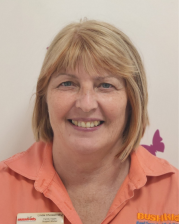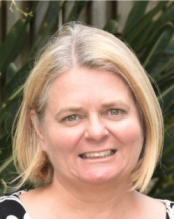
Linda Cholawinskyj and Susan Harrison from BUSHkids explain how Triple P programs help with their diverse client needs.
BUSHkids is a not-for-profit organisation supporting the health and wellbeing of children and families in Queensland’s regional, rural and remote communities.
For over 16 years, the organisation has used Triple P as part of its free preventative and early intervention allied healthcare services for children and families throughout Queensland.
Warwick-based family health support worker Linda Cholawinskyj (right) believes the partnership is a good fit.
“Triple P is so well known – and people were asking to do the program before we offered it,” she said.
“It offers practical skills in supporting families with their everyday challenges. And, of course, it’s evidence-based – the complete package.
“We also share similar organisational values, being child and family-focused.”
Her colleague, director of clinical services and strategy Susan Harrison (right), agrees.
 “What Triple P does for us as an organisation is provide a solid evidence base behind what our staff are doing,” she said.
“What Triple P does for us as an organisation is provide a solid evidence base behind what our staff are doing,” she said.
“Wherever they are, whatever they’re doing, we know they’ve had quality training based on evidence. That’s reassuring and it’s why we’ve endorsed it for our practitioners to train in and use.”
Over the past decade, Triple P programs have also been a constant as the BUSHkids executive team transformed and expanded the organisation from a team of 26 to nearly 200, supporting about 9000 clients in 2022 alone.
Linda says the most common problem parents have is the same, despite the number and diversity of clients.
“Parents come to us with: ‘I’m not sure what to do.’
“They think they are the only ones going through a parenting challenge.
“Society has changed so much in the way we manage behaviours. Also, people are exhausted – they have busy households, different family dynamics and can feel overwhelmed by children arguing, the fighting, the routines, mealtimes, sleep and dealing with consequences.
“Our first step is trying to identify the needs of the family, their goals, and then trying to facilitate some support around that for them, which can involve service linkage as well.
“Triple P helps with that – it’s always provided a very thorough and practical approach with families. That provides me with confidence when I’m working with families. It’s practical and it’s relevant to what’s happening inside families.”
Susan notes the increased level of social and emotional issues and concerns being raised by their clients.
“Something that’s definitely coming through our data is that social and emotional concerns were rising even before COVID,” she said. “And on top of all that, for many of our clients, they live in communities that experience drought or flood or fire.”
Linda says using different levels and modes of Triple P programs helps clients with this.
“There are so many different applications of Triple P – group support for families, or one-on-one, or just a tip sheet around a particular issue,” she said. “Depending on the need, we can be quite specific with families.
“The group seminar option is great as some families really benefit from hearing from others and normalising their challenges. They start to listen to each other and there’s almost a sigh of relief – there’s connection.”
“Parents comment that they love being there and hearing from like-minded people. They can have a tear, or if they want to just share – it’s real for them.
“Also, community-wise, we do seminars – for example, a school wanting to bolster the resilience within their community. There are so many options, and we can find something that will resonate with specific areas of concern for the families we are helping.
“The resources, especially the tip sheets, are fantastic. A family can take them away, or I can use it as a base for us to talk about. If a family mentions a challenge, we also share the tip sheets with other sections of our organisation such as the primary care team.
“You’re providing something to a family, even in a single session consultation, they’re going away with some information.”
Susan says this “thoroughness” of Triple P means her team is always happy to recommend training opportunities.
“There’s positive feedback about the training and its impact on their service delivery as well,” she said. “Amongst our suite of endorsed programs, Triple P is just so solid, and of course, evidence-based.”
Start your free training today
To find out how you can also access free Triple P training thanks to Queensland Government funding, visit triplep.net/qldtraining




